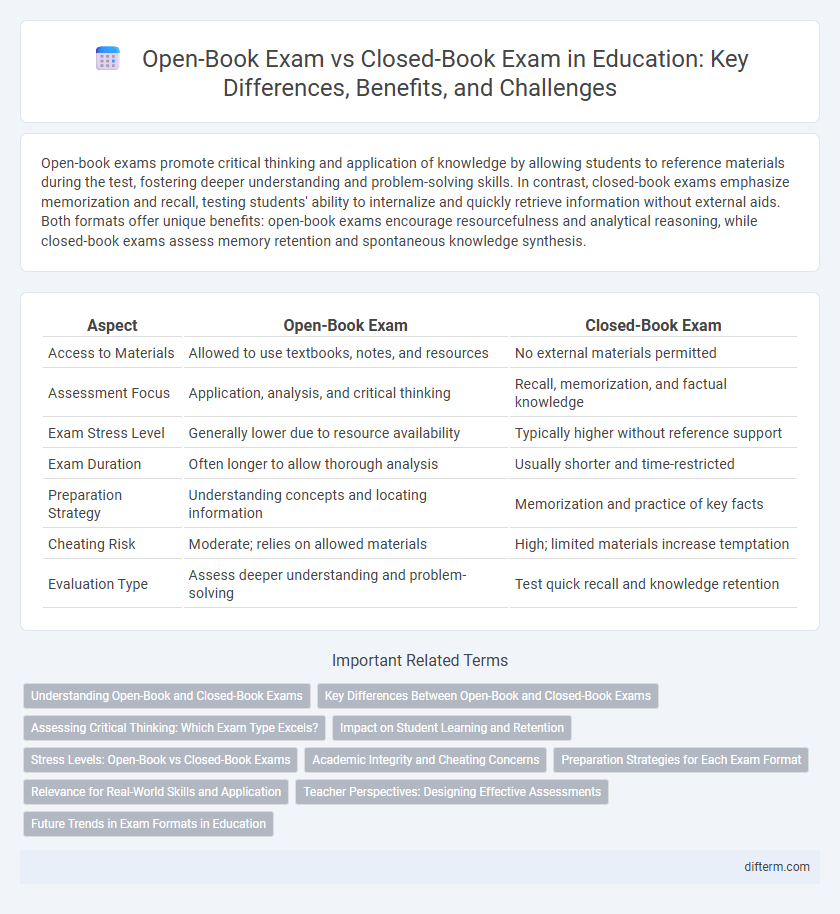Open-book exams promote critical thinking and application of knowledge by allowing students to reference materials during the test, fostering deeper understanding and problem-solving skills. In contrast, closed-book exams emphasize memorization and recall, testing students' ability to internalize and quickly retrieve information without external aids. Both formats offer unique benefits: open-book exams encourage resourcefulness and analytical reasoning, while closed-book exams assess memory retention and spontaneous knowledge synthesis.
Table of Comparison
| Aspect | Open-Book Exam | Closed-Book Exam |
|---|---|---|
| Access to Materials | Allowed to use textbooks, notes, and resources | No external materials permitted |
| Assessment Focus | Application, analysis, and critical thinking | Recall, memorization, and factual knowledge |
| Exam Stress Level | Generally lower due to resource availability | Typically higher without reference support |
| Exam Duration | Often longer to allow thorough analysis | Usually shorter and time-restricted |
| Preparation Strategy | Understanding concepts and locating information | Memorization and practice of key facts |
| Cheating Risk | Moderate; relies on allowed materials | High; limited materials increase temptation |
| Evaluation Type | Assess deeper understanding and problem-solving | Test quick recall and knowledge retention |
Understanding Open-Book and Closed-Book Exams
Open-book exams allow students to consult textbooks, notes, and other resources, promoting application and critical thinking skills rather than memorization. Closed-book exams require students to rely solely on memory and comprehension, assessing retention and quick recall under time constraints. Both exam types evaluate different cognitive abilities essential for comprehensive learning outcomes.
Key Differences Between Open-Book and Closed-Book Exams
Open-book exams allow students to refer to textbooks, notes, and resources during assessments, emphasizing critical thinking and application of knowledge rather than memorization. Closed-book exams require students to rely solely on memory and understanding, testing retention and recall skills under timed conditions. The key difference lies in the assessment approach: open-book exams assess analytical abilities, while closed-book exams evaluate memorization and immediate problem-solving.
Assessing Critical Thinking: Which Exam Type Excels?
Open-book exams enhance critical thinking by requiring students to analyze, synthesize, and apply information rather than memorize facts, fostering deeper understanding and problem-solving skills. Closed-book exams primarily assess recall and comprehension, which may limit opportunities to demonstrate complex reasoning under pressure. Research in educational psychology suggests open-book formats better evaluate higher-order cognitive abilities crucial for real-world decision-making.
Impact on Student Learning and Retention
Open-book exams promote deeper understanding by encouraging students to apply concepts and analyze information rather than memorize facts, enhancing long-term retention. Closed-book exams test recall and reinforce memory through repetition, but may lead to surface learning and short-term retention. Combining both methods can balance critical thinking skills with foundational knowledge retention for improved educational outcomes.
Stress Levels: Open-Book vs Closed-Book Exams
Open-book exams significantly reduce stress levels by allowing students to access resources, alleviating the pressure to memorize extensive information. Closed-book exams often increase anxiety as students rely on memorization and recall under time constraints. Research shows that open-book formats promote deeper understanding and lower cortisol responses compared to the heightened stress experienced during closed-book assessments.
Academic Integrity and Cheating Concerns
Open-book exams promote academic integrity by encouraging understanding and application of knowledge rather than memorization, reducing the temptation to cheat. Closed-book exams pose higher risks of academic dishonesty due to pressure-driven cheating tactics such as unauthorized materials or collaboration. Instituting clear honor codes and utilizing plagiarism detection tools can mitigate cheating concerns in both exam formats.
Preparation Strategies for Each Exam Format
Open-book exam preparation emphasizes understanding concepts deeply and organizing materials effectively for quick reference during the test. In contrast, closed-book exam preparation relies heavily on memorization, active recall, and timed practice to reinforce knowledge retention. Tailoring study techniques to the exam format enhances performance and reduces anxiety.
Relevance for Real-World Skills and Application
Open-book exams enhance real-world skills by mirroring professional environments where resource access is common, fostering critical thinking and problem-solving under realistic conditions. Closed-book exams emphasize memorization and recall, which may limit the application of knowledge in practical, dynamic situations encountered in the workplace. Prioritizing open-book assessments aligns educational outcomes with the demands of careers requiring adaptability and information synthesis.
Teacher Perspectives: Designing Effective Assessments
Teachers designing effective assessments consider open-book exams to encourage critical thinking and application of knowledge rather than rote memorization. Closed-book exams, by contrast, are valued for assessing students' recall and mastery of foundational facts under time constraints. Balancing both exam types allows educators to evaluate comprehension, analytical skills, and memory retention comprehensively.
Future Trends in Exam Formats in Education
Future trends in exam formats indicate a rise in open-book exams, leveraging digital resources and real-time information access to assess higher-order thinking and application skills. Closed-book exams continue to emphasize memorization and foundational knowledge, but integration with adaptive technology is creating hybrid models that balance recall and analytical abilities effectively. Educational institutions are increasingly adopting AI-driven proctoring and personalized assessments to enhance exam integrity and cater to diverse learning styles.
Open-book exam vs closed-book exam Infographic

 difterm.com
difterm.com